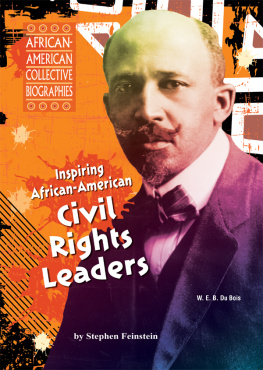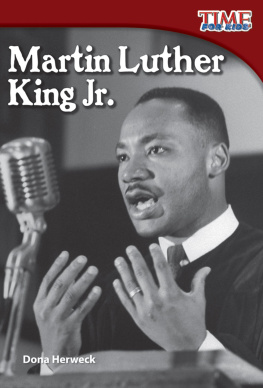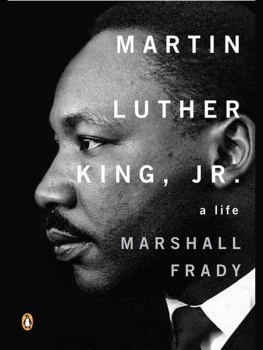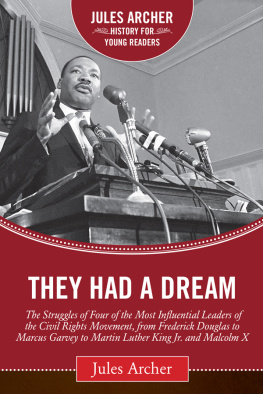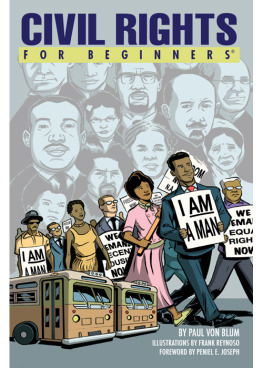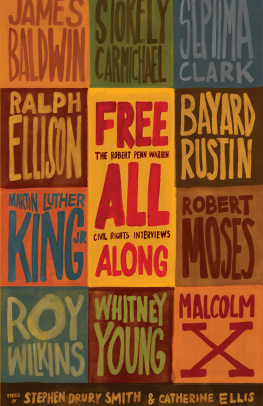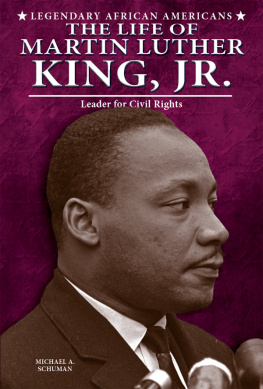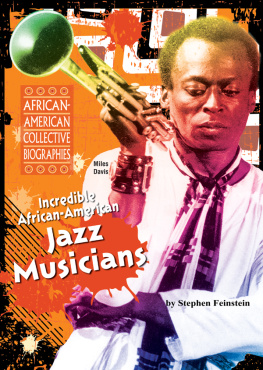Stephen Feinstein - Inspiring African-American Civil Rights Leaders
Here you can read online Stephen Feinstein - Inspiring African-American Civil Rights Leaders full text of the book (entire story) in english for free. Download pdf and epub, get meaning, cover and reviews about this ebook. year: 2013, publisher: Enslow Publishers, genre: Politics. Description of the work, (preface) as well as reviews are available. Best literature library LitArk.com created for fans of good reading and offers a wide selection of genres:
Romance novel
Science fiction
Adventure
Detective
Science
History
Home and family
Prose
Art
Politics
Computer
Non-fiction
Religion
Business
Children
Humor
Choose a favorite category and find really read worthwhile books. Enjoy immersion in the world of imagination, feel the emotions of the characters or learn something new for yourself, make an fascinating discovery.
- Book:Inspiring African-American Civil Rights Leaders
- Author:
- Publisher:Enslow Publishers
- Genre:
- Year:2013
- Rating:4 / 5
- Favourites:Add to favourites
- Your mark:
- 80
- 1
- 2
- 3
- 4
- 5
Inspiring African-American Civil Rights Leaders: summary, description and annotation
We offer to read an annotation, description, summary or preface (depends on what the author of the book "Inspiring African-American Civil Rights Leaders" wrote himself). If you haven't found the necessary information about the book — write in the comments, we will try to find it.
In INSPIRING AFRICAN-AMERICAN CIVIL RIGHTS LEADERS, author Stephen Feinstein explores the lives of eight influential civil rights leaders including Fannie Lou Hamer, Martin Luther King, Jr., and Malcolm X. Each short biography ends with a brief timeline of the persons life and achievements.
Stephen Feinstein: author's other books
Who wrote Inspiring African-American Civil Rights Leaders? Find out the surname, the name of the author of the book and a list of all author's works by series.
Inspiring African-American Civil Rights Leaders — read online for free the complete book (whole text) full work
Below is the text of the book, divided by pages. System saving the place of the last page read, allows you to conveniently read the book "Inspiring African-American Civil Rights Leaders" online for free, without having to search again every time where you left off. Put a bookmark, and you can go to the page where you finished reading at any time.
Font size:
Interval:
Bookmark:
True Leaders
Inspiring African-American Civil Rights Leaders profiles eight of the greatest leaders of the civil rights movementfrom W. E. B. Du Bois, an NAACP founder, to Fannie Lou Hamer, the vice chairman of the Mississippi Freedom Democratic Party, and Thurgood Marshall, the first African American Supreme Court Justice. Learn about the lives of these leaders and their impact on the civil rights movement.
Inspiring African-American Civil Rights Leaders is an fine introduction to the Civil Rights Movement itself.
Howard University
About the Author
Stephen Feinstein is a writer of educational materials. Among his books for Enslow Publishers, Inc., is Conserving and Protecting Water: What You Can Do.

On January 1, 1863, during the U.S. Civil War, President Abraham Lincoln issued the Emancipation Proclamation. It declared that all slaves in those states supporting the Confederacy were now free. By May 1865, all enslaved African Americans in the United States had become free. The Civil War may have ended slavery in the United States, but African Americans struggle for freedom and equality was just beginning.
At first, during the ten years of Reconstruction following the Civil War, black men were allowed to vote and hold public office. But when the federal government pulled its troops out of the South in 1877, white Southerners began to reestablish white supremacy. They had been angered by seeing blacks taking part in politics and holding public office. They were not ready to accept African Americans as equals.
Between 1865 and 1866, Southern states passed laws known as Black Codes to restrict the freedoms of African Americans. Blacks could not own property, could not travel freely, and could only work in certain occupations, such as farm work or domestic service. And not a single Southern state granted any African Americanno matter how educated or wealthythe right to vote.
The goal of white Southerners was to bring back the old plantation economy. While no longer slaves, most blacks now worked on the plantations as sharecroppers. Under this arrangement, black farmers were allowed to keep a portion of the crops they raised for the plantation owners. But their share was just enough to continue their labors. African Americans on the plantations lived in extreme poverty.
Jim Crow, or segregation, laws were put in place throughout the South, mandating separate facilities for blacks and whites. This meant that blacks could not use the same schools, restaurants, trains, hotels, or parks as whites. To maintain the system of segregation and white supremacy, some white Southerners turned to violence. In 1866, six former Confederate officers formed the Ku Klux Klan. Disguised in white robes and hoods, Klan members terrorized African Americans by whipping, burning, and lynching them.
African-American journalist Ida B. Wells (18621931), editor of a newspaper, the Memphis Free Speech, became a brave crusader against lynching. In 1895 she wrote The Red Record, a pamphlet that listed the numbers of lynchings over a three-year period. Wells received death threats from angry Southern whites, and she had to flee Memphis. She settled in Chicago, where she continued to speak out against lynching. According to historian David M. Tucker, In the long struggle against lynching, Ida B. Wells deserves more credit than any other individual for having brought this practice before the eyes of the world and, in so doing, having accelerated the establishment of law and decency in the American South.
Wells and other African Americans at the time believed that progress could only come from the willingness to fight injustice. Before the American Civil War, Frederick Douglass (18181895), an African American who had escaped from slavery as a young man by fleeing to the North, had made an eloquent appeal for such a struggle. Speaking in Canandaigua, New York, on August 3, 1857, Douglass said,
While many African Americans were willing to struggle for their rights, others believed progress would more likely come about by not agitating or confronting the white power structure. One such individual was African-American educator Booker T. Washington (18561915). Born a slave, he later became the founder of the Tuskegee Institute, a school for blacks in Alabama. As the most powerful black leader in America from 1895 until his death in 1915, Washington called for a policy of accommodation. In his Atlanta Compromise speech in 1895, he asked for just treatment from white Southerners. In return, he offered two concessions on behalf of his fellow African Americans: Blacks should concentrate on developing work skills and not engaging in politics, and blacks should not be interested in striving for social equality.
According to Washington, Every persecuted individual and race should get much consolation out of the great human law, which is universal and eternal, that merit, no matter under what skin found, is, in the long run, recognized and rewarded. By the time of his death, Washingtons ideas had been discredited among many African Americans because Southern whites had shown no inclination to compromise. It was clear that African Americans would have to struggle strenuously against discrimination and injustice.
Early in the twentieth century, many rural Southern blacks moved to cities in the South as well as the North. The National Urban League, founded in 1910, helped rural African Americans adapt to city life. The National Association for the Advancement of Colored People (NAACP), formed in 1909, waged legal battles to win voting rights for blacks. It also organized protest demonstrations. W. E. B. Du Bois, one of the founders of the NAACP, edited that organizations official magazine The Crisis for more than twenty years. On July 28, 1917, ten thousand African Americans marched in New York City to protest lynchings and racial discrimination.
In January 1941, A. Philip Randolph, the founder and head of the Brotherhood of Sleeping Car Porters, an all-black union, organized the March on Washington Movement (MOWM). The MOWM made plans for a huge march on Washington by African Americans to demand an end to discrimination in defense plants and segregation in the armed forces. Randolph called off the march when President Franklin Roosevelt issued Executive Order 8802, which called for an end to discrimination in government agencies, job-training programs, and by defense contractors. Segregation in the military, however, continued until July 1948, when President Harry Truman ended it with an executive order.

The Selma to Montgomery marches were three marches in 1965 that marked the political and emotional peak of the American civil rights movement.
Although the African-American struggle for civil rights did not begin in the 1950s, the civil rights movement of the 1950s and 1960s brought about the most dramatic progress in the battle for equality and justice. On May 17, 1954, the United States Supreme Court, in
Font size:
Interval:
Bookmark:
Similar books «Inspiring African-American Civil Rights Leaders»
Look at similar books to Inspiring African-American Civil Rights Leaders. We have selected literature similar in name and meaning in the hope of providing readers with more options to find new, interesting, not yet read works.
Discussion, reviews of the book Inspiring African-American Civil Rights Leaders and just readers' own opinions. Leave your comments, write what you think about the work, its meaning or the main characters. Specify what exactly you liked and what you didn't like, and why you think so.

